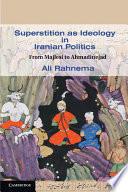
Superstition as Ideology in Iranian Politics
From Majlesi to Ahmadinejad
A superstitious reading of the world based on religion may be harmless at a private level, yet employed as a political tool it can have more sinister implications. As this fascinating book by Ali Rahnema, a distinguished Iranian intellectual, relates, superstition and mystical beliefs have endured and influenced ideology and political strategy in Iran from the founding of the Safavid dynasty in the sixteenth century to the present day. As Rahnema demonstrates through a close reading of the Persian sources and with examples from contemporary Iranian politics, it is this supposed connectedness to the hidden world that has allowed leaders such as Muhammad Reza Shah Pahlavi and Mahmud Ahmadinejad to present themselves and their entourage as representatives of the divine, and their rivals as the embodiment of evil.
- ISBN 13 : 1139495623
- ISBN 10 : 9781139495622
- Judul : Superstition as Ideology in Iranian Politics
- Sub Judul : From Majlesi to Ahmadinejad
- Pengarang : Ali Rahnema,
- Kategori : Political Science
- Penerbit : Cambridge University Press
- Bahasa : en
- Tahun : 2011
- Halaman : 0
- Google Book : https://play.google.com/store/books/details?id=hzTzAuk1D-8C&source=gbs_api
-
Ketersediaan :
As soon as they leave, Khomeyni asks his son Ahmad to tell them, “Charlatans,
stop doing these things”.223 According to another account, a woman claiming to
have been visited by the Hidden Imam tries ... 225 R. Khomeyni, Sahifeh Nur, vol.
